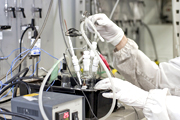Courses
- HOME
- Courses
- Department of Bioscience and Textile Technology
- Smart Device Technology (AIST)
Smart Device Technology (AIST)
Basic research and application technology for bionic,organic,polymeric,and inorganic smart materials toward high functionalities and devices.
Outline of Chair

Current cutting-edge fields that are flourishing are technologies that maximize the chemical and physical properties of organic and inorganic materials, and composites of the two, and then utilize their unique functions.
Smart materials that express useful and special functions, in addition to the characteristic physical properties that many materials have, are a result of an accumulation of wisdom about the chemistry and physics of materials. Examples of smart materials are biomedical polymers, biomaterials, electronic devices based on organic EL displays, high performance LCDs, materials for artificial muscles, sensor materials, emissive materials, biomimetic materials and other materials too numerous to list.
In addition to those, there is a considerable amount of research being conducted on composite materials in the nano-world, with nano-materials generating much innovation. The discovery of a single exceptional smart material even has the potential to partially transform the structure of industry.
Under the guidance of a team of academic advisors working on the front line in these fields, this chair carries out basic education and applied research on functional enhancement and device development of biogenic, organic, polymeric, inorganic and composite smart materials, and fosters researchers and engineers with advanced specialist knowledge and powerful insight into the fields of science and technology.
Research Fields
This chair is composed of three research fields for carrying out education and research related to the science and technology of a broad range of organic, polymeric, inorganic and composite smart materials.
- Biomaterial and Functional Science and Technology carries out research and education on biomedical polymers, high performance biomaterials, material science and technological application of biomolecules, and self-materials science and technology.
- Organic Functional Materials carries out research and education on the construction and function of biomimetic optical and electronic devices, on photonic and electronic properties of functional organic molecules and polymers for new devices, on physicochemical methods for characterization of liquid crystalline structures and applications of novel liquid crystalline materials, on energy transducing materials for artificial muscles, membranes and sensors, and on chemiluminescence and synthesis of functional organic materials.
- Inorganic Functional Materials carries out research and education on nanocomposites and biomimetic materials, on theories of strength and elastic stability of structural materials, and on fabrication of nano-materials and high strength alloys.













